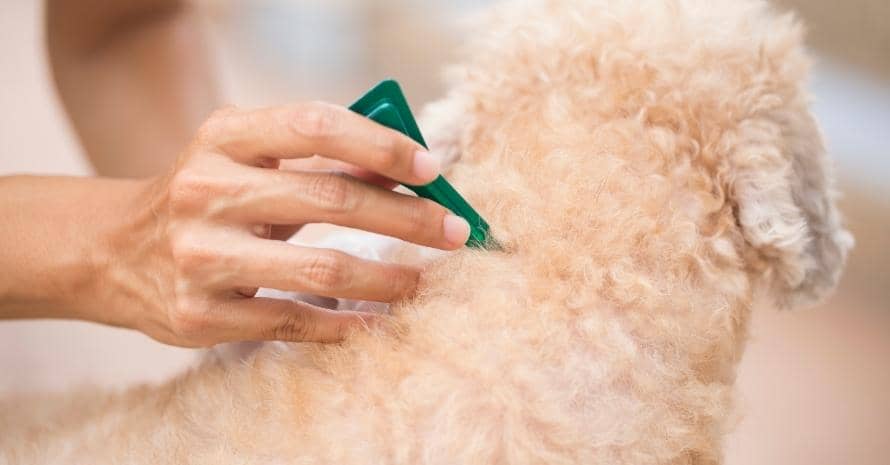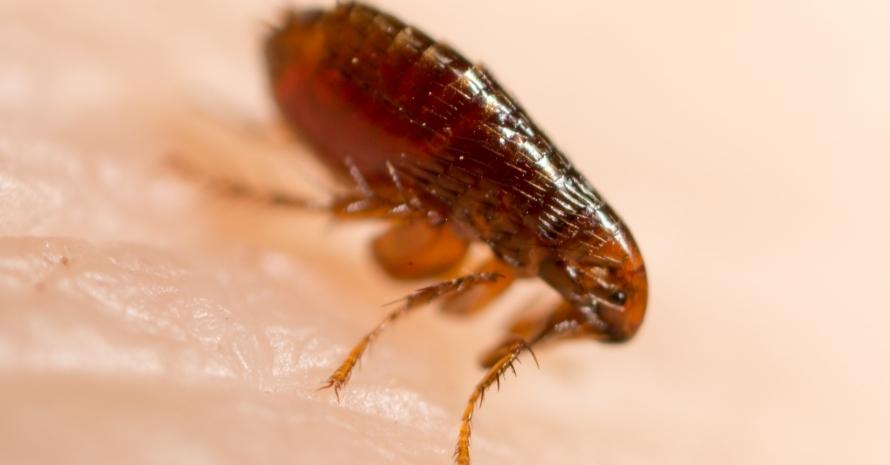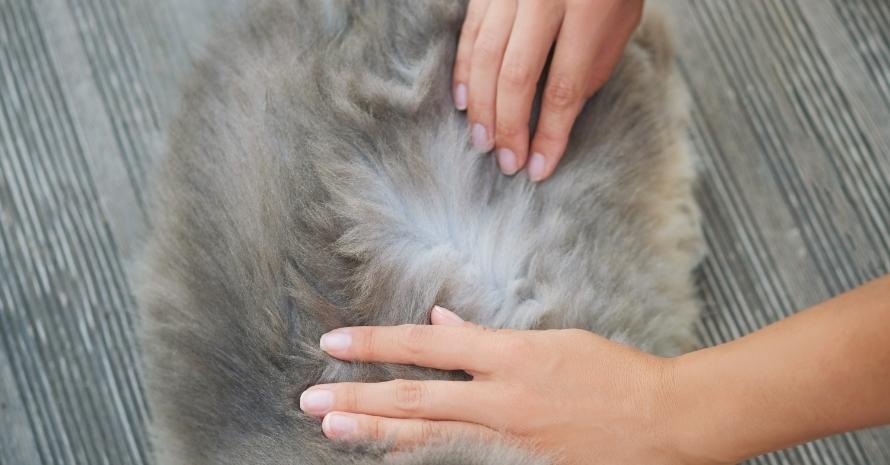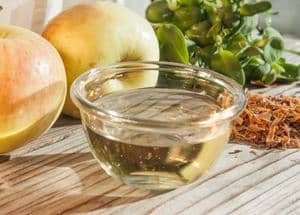It is important to prevent your pet from flea infestation. If that has already happened – don’t worry, I have effective methods to get rid of them. The pesticide market has a lot of products but you can also try natural ones. Does vinegar kill fleas? Not really. Although, vinegar is one of the tools to bring your pet immediate relief.
To solve the problem with fleas, I strongly recommend using a pharmaceutical flea treatment, such as oral flea control or topical flea control, after consulting a veterinarian. Though, as prevention or auxiliary method, you can use natural treatments that usually don’t cause side effects and are much cheaper.
How to Make an Apple Cider Vinegar Flea Trap:
- Put 8 oz. of apple cider vinegar and 4 oz. of water into a cup.
- Put half a tablespoon of salt and half a tablespoon of baking soda in a spray bottle.
- Mix the dry ingredients first.
- Add liquid ingredients slowly into your spray bottle because it will cause a chemical reaction.
- Spray it directly on your pet’s fur and massage it so it can reach the skin beneath.
- Let it air dry.
- Use it once a week or when your pet starts itching.
- Vinegar for Fleas: Guide on How to Use It
In order not to harm the animal with dangerous chemicals in pesticides, you can try a natural remedy. Vinegar can be found in almost every home, and the price is inexpensive. Fleas can’t stand the strong scent of it. You can use vinegar spray or add it to a pet bath.
Vinegar is an organic solution to eliminating fleas with mild to moderate infestation. Antiparasitic products and veterinarian consultation is needed in case of a serious infestation. Using only vinegar is not effective against severe infestation and will not cause recovery.
Can vinegar kill fleas?
Vinegar is a natural flea killer. Statistically, a female flea can lay about 40 eggs per day on an animal’s skin, which makes it hard to get rid of them.

Vinegar could repel fleas because of its taste and smell, but it is not as effective as flea remedy products. The acid in the vinegar is not strong enough to get rid of flea eggs and larvae. It’s better to use vinegar as a prevention or auxiliary method.
What kind of vinegar kills fleas?
Vinegar is the best natural remedy. So does white vinegar kill fleas? Does apple cider kill them better? Not really. White or apple cider vinegar makes fleas jump off your pet after each treatment. You can use both types, but most pet owners prefer to use the apple one. It is important to make sure that you’re using raw, unfiltered, unpasteurized vinegar.
What does vinegar do to fleas?

It can’t completely kill fleas as antiparasitic products, but it can help to repel them. Vinegar can act as prevention or as an emergency home remedy to help reduce the number of fleas. Each type of vinegar can scare away fleas due to its smell and taste. Fleas don’t tolerate pungent smells.
How to kill fleas with vinegar: Methods reviews
- Apple cider vinegar with water, salt, and baking soda. Put 8 oz. of apple cider vinegar and 4 oz. of water into a cup. Add half a tablespoon of salt and half a tablespoon of baking soda, and mix the dry ingredients. Transfer the mixture into a spray bottle. Spray it once a week or when your pet starts itching.
- Vinegar and water. Fill a spray with water and white or apple cider vinegar in proportion 50/50. Use it on a pet between baths and in your home area to prevent reinfection by fleas.
- White vinegar bath for fleas. Wash your pet with a flea shampoo if it’s recommended by your veterinarian. After rinsing the pet, add 1 quart of white vinegar to your pet’s bathing water and pour it all over the pet as a final rinse. Allow it to air dry naturally.
- Apple cider vinegar rinsing after bath. Add half of a cup of apple cider vinegar to your pet`s final rinsing water after washing. Do not towel dry after using.
It is important to not forget to rub the vinegar solution into your pet’s skin thoroughly – without this, it will not have an effect. Be careful and avoid the eyes, nose, and ears area while using vinegar solution.
If you have a dog with thick hair, fleas will struggle to get out. It might need your help with a thick comb, designed specifically to combat parasitic insects.
FAQ: What I Was Asked About Fleas

How long does it take vinegar to kill fleas?
It takes about 20 minutes for the vinegar to get rid of fleas after applying to the affected parts. It is important to allow the solution to dry out for this time and not wash it off. After about 20 minutes, use a flea comb to brush off the fleas.
What naturally kills fleas instantly?
It is impossible to kill all fleas instantly through one treatment. Due to the lifecycle of the fleas, getting rid of them needs two or more follow-up treatments within 5-10 days after the first application.
Сan you spray vinegar on dogs?
No, you better not do it because concentrated vinegar is very acidic. Use vinegar mixed with water in equal proportion. This solution is not made for applying to damaged skin, so you need to check your pet for any types of injuries before using it.
Сan vinegar hurt cats?
In general, vinegar can’t hurt cats. In the case of the treatment of fleas, keep in mind that most cats can’t stand the smell and taste of vinegar. I recommend using other methods with cats.
Final Thoughts: Is Vinegar Good for Fleas and Be the Only Treatment?
Vinegar is a good organic alternative for fleas prevention and as an aid during treatment with antiparasitic products. This method can’t be the only treatment for infestation because it helps to repel fleas and not to kill them.
Do you know of any other natural flea remedies with vinegar that worked for your pet? What do you think about using vinegar against fleas? Let us know in the comments below!
Also Read:
- Does Lysol Kill Fleas: Eliminate Fleas With Household Chemicals
- Does Bleach Kill Fleas: Get Rid of Pests at Home
- Does Salt Kill Fleas? Myths and Truth
- Does Pine-Sol Kill Fleas? Household Chemistry Repellent
- Does Lime Kill Fleas? Benefits, Types, and Safety Rules
References:
- Getting Rid of Fleas (U.S. Department of Health & Human Services) https://www.cdc.gov/fleas/getting_rid.html
- Fleas (Cornell University College of Veterinary Medicine)
https://www.vet.cornell.edu/departments-centers-and-institutes/riney-canine-health-center/health-info/fleas

